Table Of Contents
Epoxy flooring, known for its strength and reliability, might seem like an ideal option for outdoor spaces. But can it withstand the harsh conditions? Let's look into this!
UV rays can cause color fading and yellowing of epoxy coatings. Plus, extreme weather like rain, snow, and heat can further weaken it.
Moisture resistance is another factor. Epoxy coatings offer good water resistance, but may not perform well in wet conditions.
The texture of outdoor surfaces also differs from indoors. Slip resistance is crucial for safety. Professionals can help customize the epoxy coatings with additives for increased traction.
Creating a durable outdoor space? Get expert advice today!
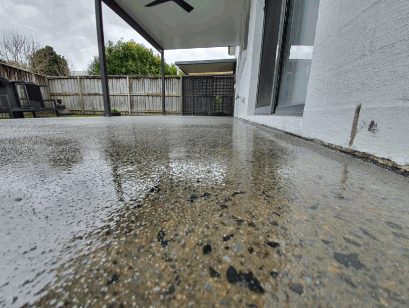
Understanding Epoxy Flooring
To understand epoxy flooring, delve into its specifics and benefits. Explore what epoxy flooring is and discover the advantages it offers. From its composition to its durability, epoxy flooring provides a seamless, easy-to-maintain surface that resists stains and enhances the overall appearance of your outdoor space.
What Is Epoxy Flooring?
Epoxy flooring is a great choice for both residential and commercial spaces. It's made of a strong and versatile material that's applied as a coating to concrete floors. This layer creates a glossy, seamless surface that's resistant to stains, chemicals, and wear.
Epoxy flooring can really make a space look great. It comes in a wide array of colors and finishes, so you can create the look you want. From solid colors to metallic effects, epoxy flooring can make any dull floor into a stunning focal point.
It's also really practical! It's incredibly tough - it can handle heavy foot traffic and impacts without showing signs of wear. It's perfect for places with lots of people, like garages, warehouses, and stores.
Plus, epoxy flooring is easy to clean and maintain. Unlike regular concrete floors, it won't absorb stains. So, it's simple to keep clean with regular maintenance. Plus, it saves time and keeps the environment hygienic.
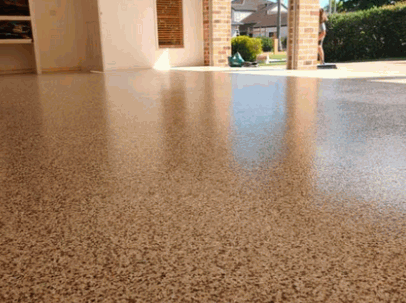
Benefits Of Epoxy Flooring
Epoxy flooring is a popular choice for both residential and commercial spaces due to its many advantages. It is known for its strength and resilience, making it suitable for areas with high usage. Plus, its smooth, seamless surface makes it easy to clean. It is also resistant to chemical spills and has anti-slip properties which improve safety. Moreover, epoxy floors have a wide range of customization options for a unique look.
A study by the American Concrete Institute (ACI) showed that when installed properly, epoxy floor systems have a lifespan of up to 20 years or more. This indicates that epoxy flooring can be a cost-effective investment.
Epoxy flooring has several benefits that improve the functionality, aesthetics, and longevity of floors in homes and businesses. It is durable, easy to maintain, and offers chemical resistance and customization options.
Can Epoxy Flooring Be Used Outdoors?
To ensure the successful use of epoxy flooring outdoors, consider various factors such as climate, exposure to sunlight, and moisture levels. Additionally, proper preparation and installation play a crucial role. Let's explore the factors to consider when using epoxy flooring outdoors and the preparation and installation process for outdoor applications.
Factors To Consider When Using Epoxy Flooring Outdoors
Epoxy flooring is tough and can withstand elements like UV rays, moisture, chemicals, and temperature shifts. Crucial for success, you must prep the surface: clean, repair any cracks or damage, and have a smooth surface.
Outdoor epoxy also needs UV-resistant properties to avoid fading or discoloring. Maintenance helps extend its life—maybe regular cleaning or reapplication of topcoats/sealants.
Weather and climate affect outdoor epoxy flooring—extreme temp, heavy rain, or too much sun can harm its durability. Plus, some epoxy formulas are made for outdoor use, containing additives like elastomers or flexibilizers for better resistance and flexibility.
For best results, talk to an expert before installing outdoor epoxy flooring. They can help choose the right product and offer advice on installation.
Weather resistance
Epoxy flooring is perfect for outdoors - it's weather-resistant! Here are some of its key advantages:
- It can handle extreme temperatures, hot or cold.
- Rain, hail? No problem! It stays strong.
- It's UV-proof, so no fading.
- A strong barrier against moisture.
- High humidity? No warping or mold.
- Great chemical resistance.
Plus, it's slip-resistant, easy to clean, and very durable!
Epoxy flooring is an excellent choice for outdoor use. MoMA in New York City uses epoxy terrazzo flooring in its outdoor sculpture garden. It's easily able to handle constant foot traffic and exposure to the elements. Proving that epoxy flooring is long-lasting and reliable outdoors!
UV resistance
Epoxy flooring is known for its durability and versatility. But, can it hold up against the destructive effects of UV rays? Let's find out if epoxy flooring can be used outdoors by looking at UV resistance.
UV rays can cause epoxy to degrade, resulting in discoloration, fading, and a shorter lifespan. However, epoxy technology has advanced, creating UV-resistant formulations. These provide better protection against these effects.
Let's look at the key characteristics related to UV resistance:
| Characteristic | Description |
|---|---|
| Color Retention | How well epoxy maintains its original color. |
| Gloss Retention | If epoxy flooring can keep its glossy appearance in sunlight. |
| Shrinkage Resistance | If epoxy stays structurally sound under temperature changes due to sunlight. |
These factors are necessary when deciding if epoxy is suitable for outdoor use. It ensures the flooring keeps its aesthetic appeal while withstanding environmental challenges.
In addition, regular maintenance and a UV-resistant topcoat can make epoxy last longer outside. This layer works as a shield against damaging UV rays.
Tip: When using epoxy outdoors, get high-quality UV-resistant products. Also, invest in maintenance for long-term durability.
By understanding the importance of UV resistance in epoxy flooring, you can make informed decisions about using this material outdoors. High-quality products and maintenance will help your outdoor space stay functional and beautiful for years.
Uncover more: Is Resin Flooring Suitable For Bathrooms
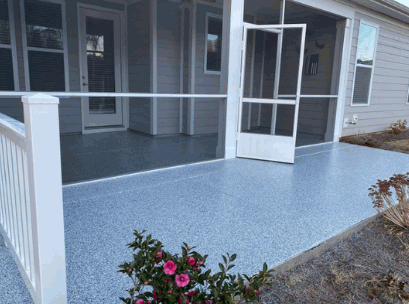
Preparation And Installation Process For Outdoor Epoxy Flooring
For outdoor epoxy flooring, start with surface preparation. Clean and get rid of dirt, debris, and any coatings. Use a pressure washer or cleaner for a smooth surface. Then, inspect for cracks, holes, or imperfections. Fill them with epoxy filler or patching compound. Then, apply an epoxy primer for adhesion. Follow the manufacturer's instructions. Allow drying time before coating.
Mix epoxy resin and hardener according to instructions. Pour some onto the surface and spread with a roller or brush. Work in sections. Add decorative elements, if desired. Sprinkle them over wet epoxy while still tacky. Once the base coat has cured, apply a protective topcoat.
Maintenance is necessary to preserve durability and aesthetics. Clean properly and avoid harsh chemicals. Look out for signs of damage or wear.
Surface Preparation
Surface Prep is a must for outdoor epoxy flooring. Without it, the epoxy won't stick and the finish won't last. Here's a 6-step guide to help you:
- Clean the surface - sweep away dust, dirt, and debris.
- Repair damage - check for cracks, holes, and anything else. Use concrete patching compound to fill them in.
- Sand - if the surface is smooth, rough it up with sandpaper or a grinder.
- Remove any grease or oil stains - use a degreaser or detergent.
- Etch - open up pores in concrete with an acid-based solution.
- Rinse and dry - wash away the residue with clean water and let it dry.
Remember, temp and humidity can affect adhesion. Follow manufacturer guidelines for optimal results. With these steps, your epoxy flooring will be strong and last longer.
Application techniques for outdoor epoxy flooring
Want to apply epoxy flooring outside? Here's a step-by-step guide!
- Clean the surface: Get rid of dirt, grease, and previous coatings.
- Fill damages: Look for cracks, chips, or other problems. Then, fill those areas with an epoxy filler.
- Prime the surface: Use a primer designed for outdoor use to enhance adhesion and protect against moisture.
- Mix and apply the epoxy: Follow the manufacturer's instructions. Then, use a roller or brush to spread it evenly.
- Allow curing time: Wait for the recommended curing time before using the floor.
Unique Details:
- Outdoor epoxies have UV-resistant properties.
- Multiple coats of epoxy give more durability and thickness.
- A topcoat adds protection against abrasion, chemicals, and weathering.
The Constructor Expert Tip: Outdoor epoxy flooring is resistant to harsh weather, making it suitable for patios, driveways, and pool decks.
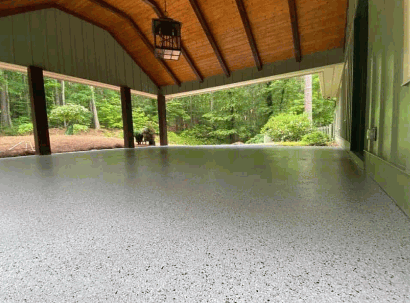
Pros And Cons Of Using Epoxy Flooring Outdoors
To ensure you make an informed decision about using epoxy flooring outdoors, explore the pros and cons of this choice. Discover the benefits of using epoxy flooring outdoors, as well as the potential drawbacks.
Pros Of Using Epoxy Flooring Outdoors
Epoxy flooring is an excellent choice for outdoor spaces, due to its several advantages, such as durability, low maintenance, enhanced safety, and aesthetic appeal. Plus, it resists fading and discoloration from sunlight, which keeps your outdoor area looking vibrant.
To get the best results when using epoxy outdoors, it's important to prepare the surface before application. Also, allow sufficient curing time for the epoxy to bond with the substrate. To keep it looking its best, regular cleaning and maintenance are recommended. And lastly, it is best to hire a professional installer for a seamless application.
By following these tips, you can maximize the benefits of epoxy flooring outdoors!
Cons Of Using Epoxy Flooring Outdoors
Using epoxy flooring outdoors has drawbacks. Points to consider:
- Epoxy can be yellow when hit by UV rays. Not nice.
- Outdoors it can be slippery when wet. Very dangerous.
- Temperature fluctuations can cause the epoxy to crack and peel.
- Harsh weather can damage the epoxy surface.
- It's not resistant to outside chemicals. Stains and deterioration may occur.
- Maintenance needs regular cleaning and resealing. Costly and laborious.
Finding an experienced professional for outdoor epoxy installation is a must. Otherwise, the application won't be good and durability will suffer.
Using epoxy outdoors has risks. Consider the cons before deciding.
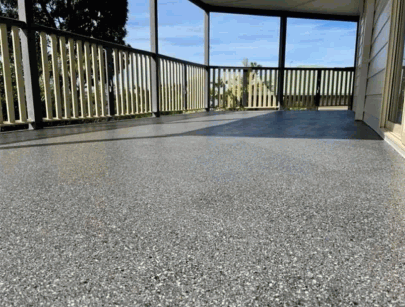
Maintenance And Care For Outdoor Epoxy Flooring
To ensure the longevity and durability of your outdoor epoxy flooring, proper maintenance and care are vital. Keep your flooring looking its best by following these sub-sections: cleaning and regular maintenance, as well as repairs and touch-ups. By adhering to these solutions, you can safeguard the quality and appearance of your outdoor epoxy flooring.
Cleaning And Regular Maintenance
To keep your outdoor epoxy flooring in good shape, follow these six steps:
- Sweep or vacuum regularly. This removes dirt and debris which could cause scratches.
- Damp mop with a mild detergent or epoxy cleaner. Don't use harsh chemicals or abrasives.
- For tough stains, scrub with a soft brush or sponge. Rinse off any residue.
- Protect high-traffic areas with a coating every 6 months. Ask a pro for advice.
- Oil-based stains should be soaked up with kitty litter or baking soda. Let it sit for a few hours then sweep it up.
- Check the flooring for signs of damage. If you spot any, contact a pro for repairs.
Also, direct sunlight can discolor the floor over time. To prevent this, install shades or awnings to shield it from UV.
With consistent cleaning and maintenance, you can save money and keep your outdoor epoxy floor looking great for years.
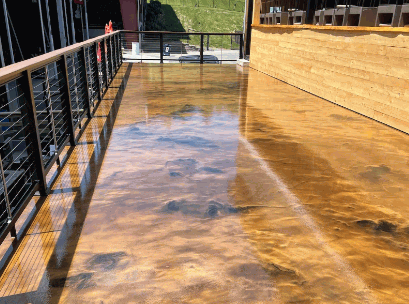
Repairs And Touch-Ups
Inspect the surface often! Check for cracks, chips, and other problems. Clean the area carefully before fixing it. Use epoxy patching compound with a putty knife. Sand and polish if it looks rough. If extensive damage, get professional help!
Also, maintenance is key. Look after your epoxy flooring to avoid costly repairs. Don't let it deteriorate, act now to keep it in great shape.
Conclusion
Epoxy flooring is becoming a popular choice for many outdoors. Its strength and weather resistance make it great for outdoor areas, like patios, driveways, and garages.
Epoxy can resist extreme temperatures, UV rays, rain, and snow. Plus, it can be mixed with anti-slip additives to prevent slips and falls.
Another plus - epoxy flooring is low-maintenance. It's easy to clean and doesn't need regular sealing or waxing.
In the 1960s, NASA searched for a solution to protect aircraft hangar floors. They found epoxy coatings could handle the tough conditions. Since then, epoxy has been used more and more outdoors.


